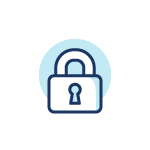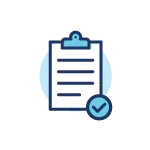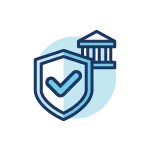
Your Security is OneAZ's Top Priority!
Please report any suspicious activity immediately.
Remember, OneAZ Credit Union will NEVER request your User ID, Password or any one-time PINs or codes needed to log in to online banking. This information is personal to you, and we urge you to NEVER share that information with anyone.
If you are unsure of the identity of a person claiming to be a OneAZ associate, hang up and call us back at our main number: 844.663.2928.
If you encounter any of these scams or have concerns, contact us immediately.
Trending Scams Alert!
Stay informed and protect yourself from the latest scams targeting OneAZ members. Here are the scams we're currently seeing:
Watch Out for These Scams
Targeting Retirees
Scammers Posing as Government or Business Reps Targeting Retirees
Fraudsters are using fake emergencies to pressure older adults into transferring large sums of money. Know the warning signs and how to stay safe.
Common Scam Tactics:
-
Fake account alerts: Claims of suspicious activity on your bank or Amazon account.
-
Criminal threats: Saying your Social Security number is linked to crimes.
-
Tech support scams: Fake alerts about hacked computers with numbers to call.
-
Urgent instructions: Telling you to move money to “protect” it or help catch criminals.
How to Stay Safe:
-
Don’t send money or info in response to unexpected calls or messages.
-
Speak to someone you trust before acting.
-
Verify claims using official contact info — never trust the details in the message.
Amazon, is that really you?
Watch out for fake Amazon texts offering refunds for recalled items.
Scammers are sending messages claiming there's an issue with something you bought and offering a refund — but it's a phishing attempt to steal your info. Don’t click links or reply. Always verify directly through the official Amazon site or app.
🔒 Stay safe:
-
Ignore unexpected texts with links
-
Check your Amazon account through trusted channels
-
Contact the company directly if unsure
MVD Text Message Scam
Scammers are posing as the Arizona MVD, texting about fake unpaid tickets and threatening to suspend your license or vehicle registration. Their goal? To steal your money and personal info.
Protect Yourself:
-
Don’t click links or reply to unexpected DMV texts.
-
Contact your DMV directly using a trusted website or phone number.
-
Report scam texts by forwarding them to 7726 (SPAM), then delete.
Stay cautious—think before you click!
Common Scams
Phone Scams
Beware of phone increasing scams where fraudsters impersonate the FBI, claiming your Social Security number has been compromised. They may try to pressure you into giving personal information. Never provide sensitive details over the phone. Legitimate government agencies won’t make such requests. If you receive such a call, hang up immediately.
Back to School!
If you’re moving too quickly, it’s easy to miss details when shopping for school supplies. From the return and refund policies to delivery times and fees, there can be unwelcome surprises. Study this advice before you hit the order button.
Utility Payment Scam
Only scammers demand you pay a certain way - a way that makes it hard for you to get your money back. Be on the lookout for those who create a sense of urgency and suggest you wire money, put money on a gift card, use payment apps, pay with a scannable barcode or QR code, or pay using cryptocurrency. Your utility company won’t demand you pay that way.
WhatsApp Scam
Scammers are targeting WhatsApp users with fake remote job offers. You might receive a message promising a job that pays hundreds of dollars a day. However, there’s a catch—they’ll ask for your Social Security number. Do not share it.
If you encounter a scam text, forward it to SPAM (7726) or use your phone’s “report junk” feature to delete and report it. Most cellular providers do not charge for texts sent to 7726.
Text Message Scam
Members have reported receiving text messages acting in the name of OneAZ. The message asks to verify a transaction followed by a suspicious hyperlink such as vismon.es and creadiva.es. Do not click on these fraudulent links.
Remote Access
Remain alert! Fraudsters are posing as employees of companies such as Geek Squad, Amazon, and Google requesting to gain remote computer access. Do not allow others to remote access into your computer. Remember to protect your online banking credentials and passwords.
Imposter Scams
Be on the lookout for imposter scams. Imposter scams happen when a scammer impersonates someone else, like a government or bank employee, to steal a victim’s money or personal information. Imposter fraud has been the most reported scam for years, according to the FTC.
Job Posting Scam
Looking for a job? Avoid scammers in the job postings. Scammers impersonate well-known companies and recruit through displaying fake jobs on LinkedIn and other platforms. Spot, avoid, and report scams with the Federal Trade Commission’s (FTC) Money Matters program. Check it out for tips on avoiding job scams.
OneAZ Imposter Scam
Fraudsters are targeting our members by reaching out through text and phone call. These imposters are acting as OneAZ and asking for information like usernames and passwords AND/OR stating funds need to be moved using services such as CashApp and Zelle.
OneAZ Phishing Scam
Fraudsters are targeting our members by reaching out through text followed by phone. These imposters are acting as OneAZ and asking for information by saying ‘there has been a suspicious login on (date) in (Name a city, State). Please confirm yes or no’. Please note fraudsters may spoof the OneAZ phone number. Do not share your username or one-time passcodes. OneAZ associates will never ask you for this information.
OneAZ Check Payment Scam
Lookout for checks coming through the mail using the likeness of OneAZ. This includes use of the OneAZ logo and/or signatures from OneAZ associates. The checks are going through the mail alongside gift card scam letters from Walgreens, CVS, and BeMyVision.
Jury Duty Scam
Increased reports in Jury Duty related scams, especially in the Northern region. Fraudsters are calling members pretending to work for the court system or Law Enforcement and through the use of phony warrants, encourage large cash withdrawals to settle said warrants. Victims are advised not to discuss the reason for the withdrawal with others creating a fearful state.
ATM Skimming
Fraudsters are placing skimming devices on ATMs. Inspect ATMs before use, looking for items that are loose or damaged. Pinhole cameras may be placed on the machine at an angle that allows a PIN to be captured. Use ATMs in well-lit areas and if your card is not returned, report the incident immediately.
Bitcoin ATM (BTM) Scam
Fraudsters are using BTMs to steal money. Scams start with a call or text message about you being at risk - saying you’re linked to money laundering or a warrant. Victims are asked to deposit large sums of cash into a specific BTM which is routed to the fraudster. Real businesses and government agencies will never ask you to deposit money into a BTM.
Text Messages Scam
Members are receiving fraudulent text messages from oneaz-credit.union-msg-alert-ikkf@oneazcu.com. OneAZ will never send you a test message from this address. We kindly ask that you do not engage with this message. For additional protection, please block this address from contacting you in the future.
Incident
Members are being asked to call 855.574.2597. Upon calling, users are connected to a fake 'Security Department' that is not related to OneAZ Credit Union. OneAZ kindly asks you to not engage with this number. For additional protection, please block this number in your phone.
Unexpected Package at Your Door?
Beware of unexpected packages! If you receive a gift with no sender info and a QR code to scan, it could be a phishing attempt to steal your personal data. Do not scan the QR code! Scanning the code may lead to malicious websites or malware. If you’ve scanned a suspicious QR code, change your passwords immediately and enable two-factor authentication. Stay vigilant—protect your personal details to avoid falling victim to scams!

We're committed to your security.
Use these resources to help protect yourself against online and offline threats.

Fraud Protection
Understanding how fraudsters work is the first step to keeping your personal information secure.

Security Tips
Take a proactive approach to online and financial security with these tips.
Email Security
Learn how to identify authentic OneAZ emails and links to protect yourself against online fraud.
Phone
Member Care Center Hours
Monday – Friday: 8:00 AM – 6:00 PM
Account Help & Member FAQs
Please report any suspicious activity immediately. Remember, OneAZ Credit Union will NEVER request your User ID, Password or any one-time PINs or codes needed to log in to online banking. This information is personal to you, and we urge you to NEVER share that information with anyone. If you are unsure of the identity of a person claiming to be a OneAZ associate, hang up and call us back at our main number, 844.663.2928.
If you encounter any of these scams or have concerns, contact us immediately.
1 Monitoring services are provided to the primary account holder on an entitled basis and require consumer activation. For additional details about the services, including terms, conditions, and limitations, please visit oneazcu.nxgstrategies.com.


